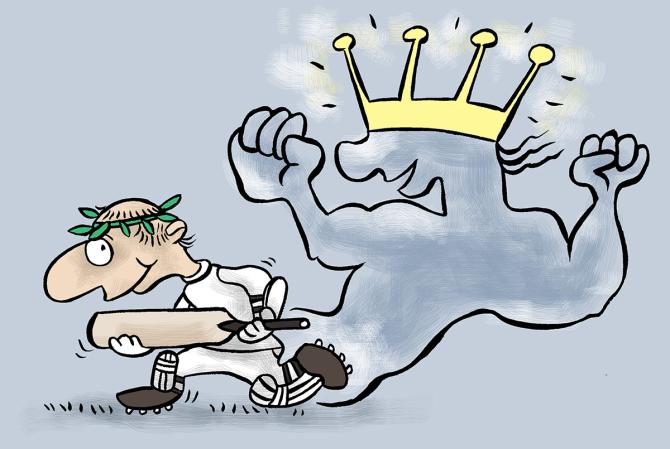India added three unicorns per month in 2021 to nearly double the overall number to about 85 at last count.
And there are many gazelles and cheetahs in the pipeline. All gunning to be unicorns (and then decacorns) soon thereafter, notes Sandeep Goyal.

Way back in 75 BCE, Julius Caesar was still a junior politician on the way up in Rome.
Sailing across the Aegean Sea, a band of Sicilian pirates captured Caesar.
When the pirates told him that they had set his ransom at 20 talents (approx 620 kg of silver, worth about $600,000 today), he mocked them for not knowing whom they had captured and suggested that 50 talents (around 1,550 kg of silver, worth about $1.5 million) would be a more appropriate amount to ask for.
Caesar, crafty and intelligent as he was, knew that he couldn't possibly allow himself to be ransomed so cheaply.
The pirates were very confused. How could a captive be negotiating to ask for his ransom to be upped? But they acquiesced.
Caesar then sent his followers out to Rome to gather the money and settled in for a period of captivity.
The task took 38 days. But in the process, a little-known Julius Caesar became incredibly famous in Rome, without even being present there.
No one had ever been ransomed for such a vast sum before.
Everyone in Rome suddenly felt that Caesar must be very special, must be incredibly important to merit such a huge ransom call.
That ransom demand, cleverly manoeuvred and managed by Caesar, surely and securely, put him on top of the leaderboard of all-time greats of Roman polity.
Thus, in 75 BCE, Caesar invented the Veblen effect and became himself a Veblen brand, although economist Thorstein Veblen wouldn't give it that name for another 2,000 years.
Caesar had placed a value on himself greater than anyone in Rome.
But, as far as anyone in Rome knew, it wasn't him who had done it but it was an independent valuation.
And because Caesar was highly valued, his men had little trouble raising the ransom money. They returned to the island, and freed him.
What is driving up the start-up world of innovation-driven entrepreneurship in India today? Well, again the Veblen Effect.
Frankly, fairly low-quality entrepreneurship is suddenly creating a slew of unicorns.
The ideology of entrepreneurialism to mass-produce and mass-market products that have huge perceived value is actually leading to Veblenian Entrepreneurship.
Aside from lowering the average entrepreneurial quality, Veblenian Entrepreneurship has a range of (short-run) positive and (medium- and long-run) negative effects for both businesses and society at large.
The rise of the Veblenian Entrepreneur actually contributes to creating an increasingly Untrepreneurial Economy.
That is an economy that superficially appears innovation-driven and dynamic, but is actually rife with inefficiencies and unable to generate economically meaningful growth through innovation.
We have over recent months witnessed the steep fall in Paytm stock; and have seen the chaos going on at BharatPe.
There are many more examples. Nevertheless, India added three unicorns per month in 2021 to nearly double the overall number to about 85 at the last count.
And there are many gazelles and cheetahs in the pipeline. All gunning to be unicorns (and then decacorns) soon thereafter.
But do all these start-ups actually merit the billion-dollar unicorn status? Many, if not most, will never make a profit.
But an independent valuation (hey, remember the Caesar story) by learned venture capitalists and private equity players has assigned the start-up a certain value -- and the learned men who accorded that enterprise value would surely not be wrong.
And then the journey forward from Series A to Series B to Series C furthers the illusion we call the Veblen effect.
Unicorns in India today tend to 'specialise' in the art of commanding billion dollar valuations, irrespective of their profitability, as deep-pocket investors from the private equity world willingly partake in the 'well-narrated rosy story, with the promise of thumping success in the future', which discounts several years of earnings down the line.
The fantabulous amounts paid out at the recently concluded Indian Premier League auction will soon trigger a Veblen effect of another kind.
A record 10 players were bought for more than Rs 10 crore (Rs 100 million) by the enthusiastic franchises on Day 1.
Ishan Kishan was bought for Rs 15.25 crore (Rs 152.5 million); Deepak Chahar was bid and bought at a whopping Rs 14 crore (Rs 140 milliuon); while Shreyas Iyer was pocketed for Rs 12.25 crore (Rs 122.5 million).
Shahrukh Khan and Rahul Tewatia were the biggest uncapped buys, bought at Rs 9 crore (Rs 90 million) each, respectively.
Come to think of it, a top bowler through a season of an IPL rarely manages more than 20 wickets.
If bought for Rs 10 crore, that is Rs 50 lakh (rs 5 million) a wicket! Even an Ishan Kishan, if he scores 500 runs in one season, will be pocketing Rs 3 lakh (Rs 300,000) a run!
And what will the Veblen Effect do? Well, push up the ad endorsement rates of each of these emerging stars to many times more than their current asking rate -- after all 'independent valuation' had gotten them their record auction prices!
Hail, Caesar! Cheers Veblen!
Sandeep Goyal is managing director, Rediffusion
Feature Presentation: Rajesh Alva/Rediff.com











